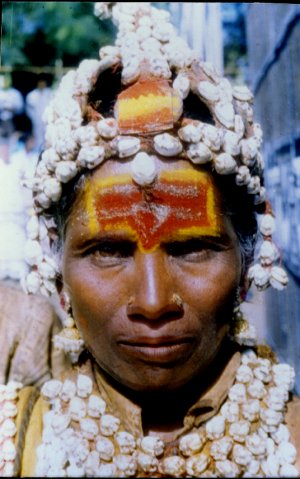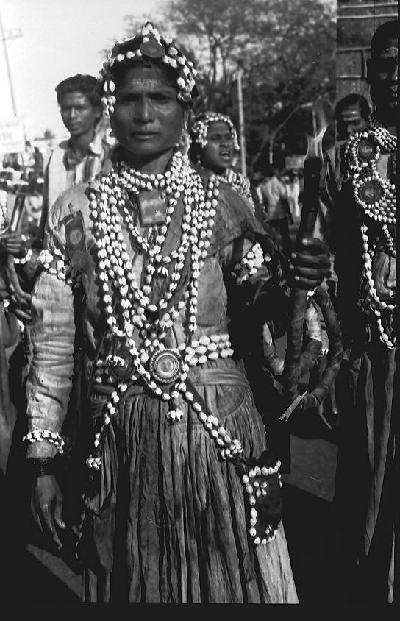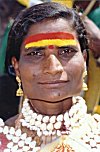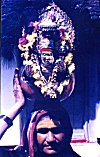The Yellamma Cult
by K. L. Kamat
First Online: July 31, 2000
Last Updated On: December 07, 2024
Dr. Kamat writes on a mysterious, controversial, and often misunderstood cult of Devadasis in India. The followers of this occult, called as Jogathis are exploited and condemned as temple women and/or prostitutes. In the recent years, the various Governments have restricted their rituals and this control has led to several violent and caste-based conflicts.- Ed.
In southern parts of India, Goddess Yellamma is known for her abundance strength. She is also known as Jogamma, Holiyyamma, Renuka and by other such names. Her temples are located at Soudathi in Belgaum district, Chandraguthi in Shimoga district and Hulgi in Bellary districts of Karnataka State. In neighboring states like Maharashtra and Andhra Pradesh there are innumerable devotees of this Goddess.
History of the Deccan tells us that the ritual of temple women (or devadasis) was well established by the 10th century A.D. The Devadasis were invariably women, typically resided in the temples, and were educated as artists and courtesans. It is not clear if the Yellamma cult has its roots in the Devadasi tradition. There are many stories about the origin of the Yellamma cult. The most prevalent one says that Renuka was the daughter of a Brahmin, married to sage Jamadagni and was the mother of five sons. She used to bring water from the river Malaprabha for the sage's worship and rituals. One day while she was at the river, she saw a group of youths engaged themselves in water sports and forgot to return home in time which made Jamadagni to suspect her chastity. He ordered his sons one by one to punish their mother but four of them refused on one pretext or the other. The sage cursed them to become eunuchs and got her beheaded by his fifth son, Parashuram. To everybody's astonishment, Renuka's head multiplied by tens and hundreds and moved to different regions. This miracle made her four eunuch sons and others to become her followers, and worship her head.
© K. L. Kamat

Given to God
A Devotee of Yellamma
The followers of Yellamma, who are mostly poor, and illiterate, take an vow to dedicate themselves, their spouses, or their children in the service of Goddess Yellamma when they are unable to face the hardships of life. The typical situations include life-threatening diseases, infertility, and dire financial troubles. These are the people who are primarily responsible for propagating Goddess Yellamma's virtues and achievements and glorify the Goddess. An elaborate ceremony is held in order to initiate the Jogathis (female) and Jogappa (male) volunteers in the service of Goddess Yellamma. New followers have to bathe in three holy ponds and proceed to the head priest accompanied by community elders and other members of the family. The priests give them a long sermon on what they have to do please Yellamma. They have to identify themselves with the very poor and unfortunate ones and serve the society. At least twice a year they have to visit the Yellamma shrine on full moon days to express and confirm their obedience. During this semi-annual ritual, they have to observe preferably total nudity. If not, they have to cover their bodies with Neem foliage or scanty clothes. Such rituals, especially in the last decade, have become heavily publicized events due to the oversexed youngsters and tourists who gather around such pilgrimage centers to have glimpses of nude and semi-nude human bodies.
The devotees of Yellamma decorate their forehead by smearing turmeric (Haldi) and vermilion (Kum-kum). Usually they do not go in for expensive ornaments. Crowns, earrings and necklaces are made out of cowries. Some of them do not wear any ornaments at all. The male devotees dress like men, but many Jogappas prefer to dress like Jogathis (symbolic of the sons of Renuka who became impotent), although it is extremely difficult for them to hide their male characteristics. They sometimes engage in female sexual gestures. Thus, wherever Jogappas are around young males hover around them. The public enjoy themselves by hissing, shouting, whistling and calling names at them. The Yellemma followers just ignore them and go about their life.
The Jogappas acting like Jogathis should not be mistaken for natural or otherwise eunuchs (Hijras) who are primarily entertainers. The Hijras move in groups of three to five, play drums, clap, sing and dance for alms. They are born hermaphrodite or neuter. Hence their sexual organs are malfunctioning or non-functioning. But they make different gestures in order to arouse erotic urges among human males. These acts of theirs bring in good deal of money and some groups have made a fine profession out of it. They sometimes kidnap young boys and girls, castrate them and induct them into the profession. At various social functions such as weddings and child births, their presence is desired and hence demand a good remuneration.
Most of the time, the Jogathis carry a metal vessel or a bamboo basket on their head which stays stationary without any support. Hence it looks like it's part of their body. The followers of cult believe that it is their deity's blessings that made it possible. The basket or the vessel is meant to carry a brass bust of Yellamma. It is very artistically decorated with a great variety of flowers. Some Jogathis use different colored cloth for the same purpose. It is a sight to see them dance carrying the icon on their heads. They dance rhythmically in a predetermined pattern. One or two Jogappas play drums.
© K. L. Kamat
|
A devotee of Yellamma
Vishwa Kannada Sammelan, Mysuru 1985
One of the most mysterious and misunderstood aspect of this extremely religious cult is, their intention to serve their deity by attending the needs of general public which includes fulfilling sexual urges of men around. This has led to the common belief that they practice prostitution. It is extremely unfortunate that the cult members social service has been misinterpreted and exploited as a profession. The various state Governments have since banned the nude parade of worshippers (most of whom were women of low caste) of Yellamma, after violent debates in the society about their rights and wrongs. The ban has resulted in resentment among the followers of Yellamma.
![]()



